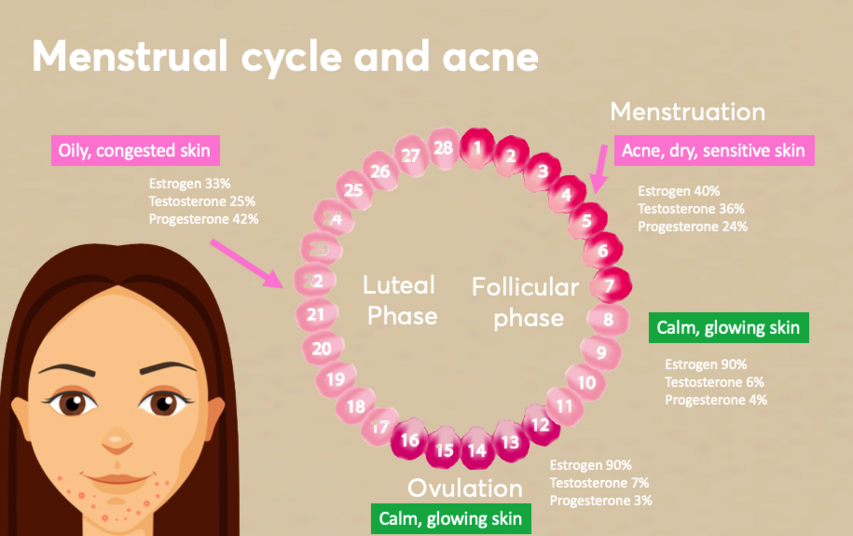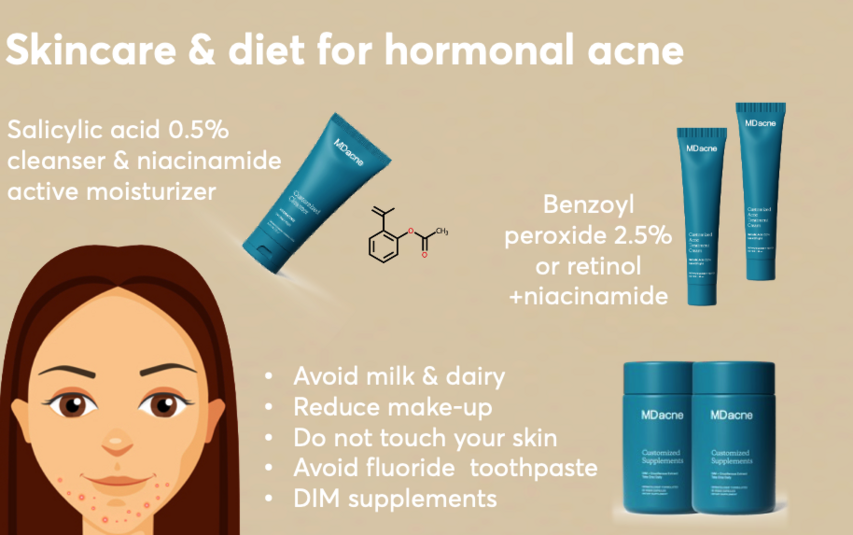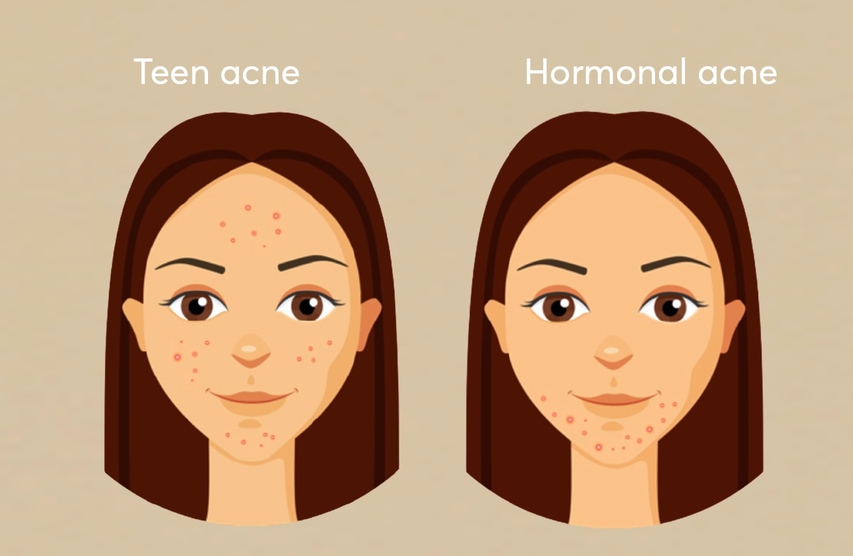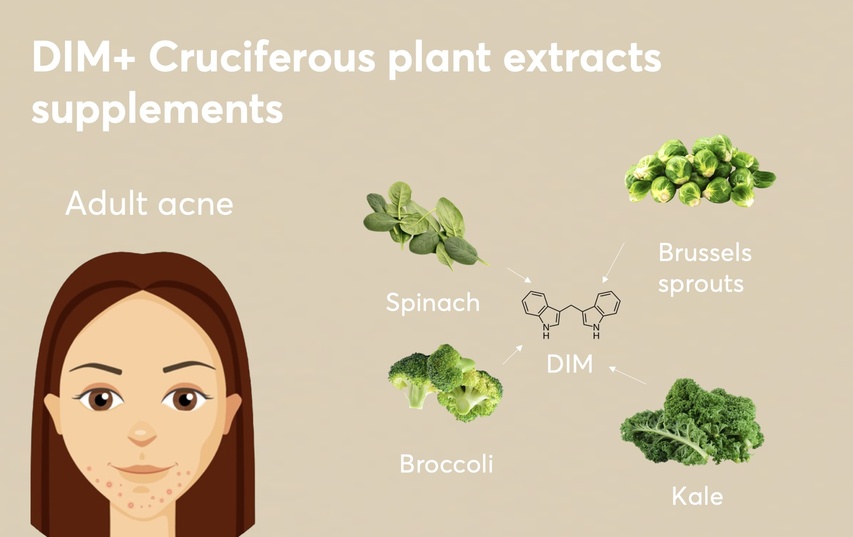Hormonal acne: Best treatment according to Dermatologists

Key Points
- Hormonal acne affects up to 50% of women in their 20s and often appears as comedones, cysts, and inflammation on the chin and jawline due to androgen-driven oil production.
- Effective treatments for hormonal balance include topical retinoids, niacinamide, salicylic acid, oral contraceptives, spironolactone, and DIM supplements.
- A tailored routine with non-comedogenic skincare, anti-inflammatory nutrition, and hormone-targeted therapies offers the best results for clearer skin.
What is Hormonal Acne?
Hormonal acne occurs when fluctuations in hormone levels trigger changes in the skin, such as the enlargement and clogging of sebaceous glands, bacterial growth, and inflammation. These hormonal shifts often lead to increased oil production and clogged pores, resulting in acne breakouts.
Hormonal acne is very common, affecting about 50% of women between ages 20-29 and 25% of women between 40-49. It can also appear in teenagers, peri-menopausal, and menopausal women, though it's not as prevalent in these groups.
Symptoms of Hormonal Acne
In teenagers, hormonal acne typically appears in common areas, such as the forehead, cheeks, around the mouth, and chin. In adults, hormonal acne typically appears on the lower face, including the mouth, chin, jawline, and occasionally the sides of the neck.
Hormonal acne presents as a combination of:
- Comedones (blackheads and whiteheads)
- Papules and pustules (inflamed pimples)
- Cysts or “under-the-skin bumps,” which are deeper and may not always be visible.

Causes of Hormonal Acne
Hormonal acne is primarily triggered by fluctuations in hormones such as:
- Estrogen and progesterone: Levels fluctuate throughout the menstrual cycle.
- Testosterone: Present in both men and women, testosterone can increase oil production.
- Cortisol: Known as the stress hormone, it can exacerbate oil production and inflammation.
Hormonal shifts can occur during the menstrual cycle, with changes in birth control, pregnancy, or perimenopause and menopause. Additionally, conditions like polycystic ovarian syndrome (PCOS) and genetics play a role, with studies indicating that 67% of women with hormonal adult acne have a family history of the condition.
Menopausal Acne
Menopausal acne occurs in women in their 40s and 50s, often triggered by declining estrogen levels or an increase in androgen hormones like testosterone. Hormone treatments for menopause, particularly those containing progestin, can also lead to hormonal acne.
Best Treatments for Hormonal Acne
A personalized, over-the-counter, medical-grade acne treatment can often manage mild hormonal acne. However, more severe cases may require oral treatments such as oral contraceptives, spironolactone, or DIM (diindolylmethane) supplements.

Topical Treatments for Hormonal Acne
Effective topical treatments for hormonal acne should be tailored to the individual's skin type and the severity of their acne. Key ingredients include:
- Salicylic acid: Unclogs pores and reduces inflammation, particularly in mild acne.
- Retinol and Niacinamide: Reduce acne symptoms and signs of skin aging.
- Benzoyl peroxide: An FDA-approved, powerful anti-acne ingredient recommended by the American Academy of Dermatology (AAD). Micronized formulations, like 2.5% benzoyl peroxide, offer strong anti-acne effects with fewer side effects, making them suitable for sensitive skin.
For cleansers, a low percentage of salicylic acid (around 0.5%) is ideal, as it helps to cleanse pores without over-drying. Look for gentle, plant-based ingredients that combat inflammation while keeping skin hydrated.
Moisturizers should be oil-free and formulated for acne-prone skin. Choose a niacinamide moisturizer for normal to oily skin or a more hydrating option for drier skin. Formulations combining retinol and niacinamide are excellent for targeting both hormonal acne and early signs of aging. Start with a mild strength (retinol 0.25% + niacinamide 2%) and gradually increase as tolerated.
Selecting the right sunscreen is crucial—opt for an oil-free, non-comedogenic formula that won’t clog pores. Lightweight, invisible sunscreens are generally preferable to heavy “white-cast” options.
Oral Contraceptives for Hormonal Acne
Birth control pills are a popular option for managing hormonal acne, but not all contraceptives are effective for acne treatment. The most effective pills contain ethinyl estradiol combined with drospirenone, norethindrone, or norgestimate. These pills can help reduce acne by regulating hormones, but they’re not suitable for everyone—women with a history of blood clots, high blood pressure, breast cancer, or who smoke should avoid them.
A study in the Journal of Drugs in Dermatology found that certain contraceptives, including Yaz, Ocella, Yasmin, Trinessa, MonoNessa, Apri, and Reclipsen, are particularly effective for acne. Others, such as NuvaRing, Microgestin, and Ortho Evra, have limited effects on acne, while some, like Depo-Provera and Nexplanon, may even exacerbate it.
Spironolactone for Hormonal Acne
Spironolactone, initially used to treat hypertension, is an effective anti-androgen treatment that reduces oil production in the skin. This helps prevent clogged pores and acne breakouts. It’s especially beneficial for women with hormonal acne who have higher androgen levels.
Natural Treatments for Hormonal Acne
A balanced diet can have a positive impact on hormonal acne. Anti-inflammatory foods, such as vegetables, fish, nuts, olive oil, and avocados, are beneficial, as well as nutrient-rich foods like dark chocolate, pumpkin seeds, Brazil nuts, and carrots. Reducing dairy and refined sugars can also improve skin health.
The DIM + Cruciferous Supplement is a powerful addition to the treatment of hormonal acne. It contains extracts from cruciferous vegetables, such as kale, broccoli, and spinach. These natural compounds help balance hormones, potentially reducing acne symptoms in adult women.
By understanding the causes and tailored treatment options for hormonal acne, you can better manage breakouts and support your skin’s health. Whether you choose topical treatments, oral medications, or dietary changes, effective strategies are available to help you achieve clearer skin.
Shop:
DIM supplements for women with adult or hormonal acne.
Retinol treatment system for women with adult acne.
References:
DIM -The best supplements for adult acne and hormonal acne
Adult female acne: a guide to clinical practice. Anais Brasileiros de Dermatologia vol. 94,1 (2019): 62-75.
Adult-onset acne: prevalence, impact, and management challenges.” Clinical, cosmetic, and investigational dermatology vol. 11 59-69.
Emerging Issues in Adult Female Acne. The Journal of Clinical and Aesthetic Dermatology, Vol. 10, No. 1 (2017): 37-46.
To find the right acne treatments for your unique skin, take the free skin assessment by clicking here.





